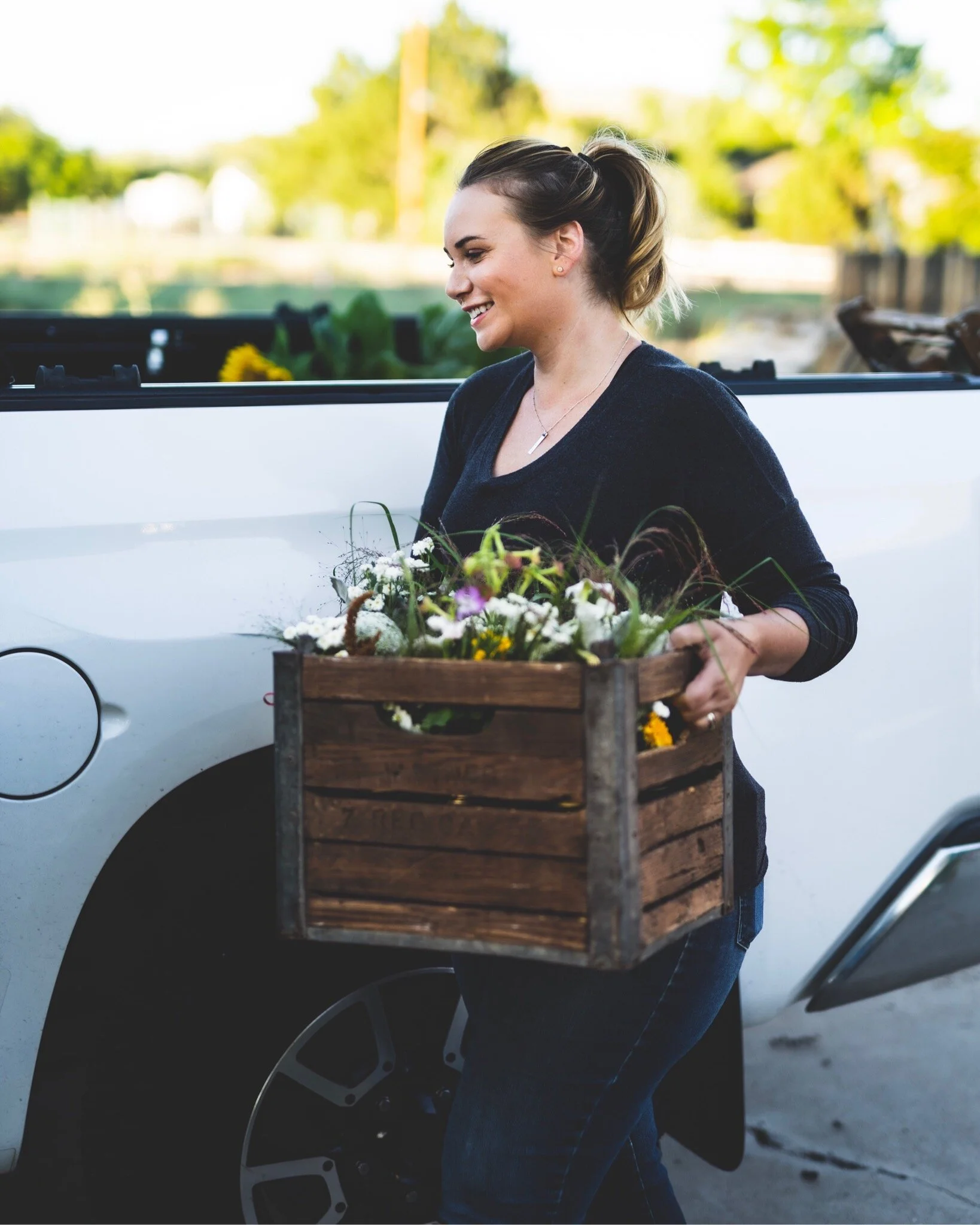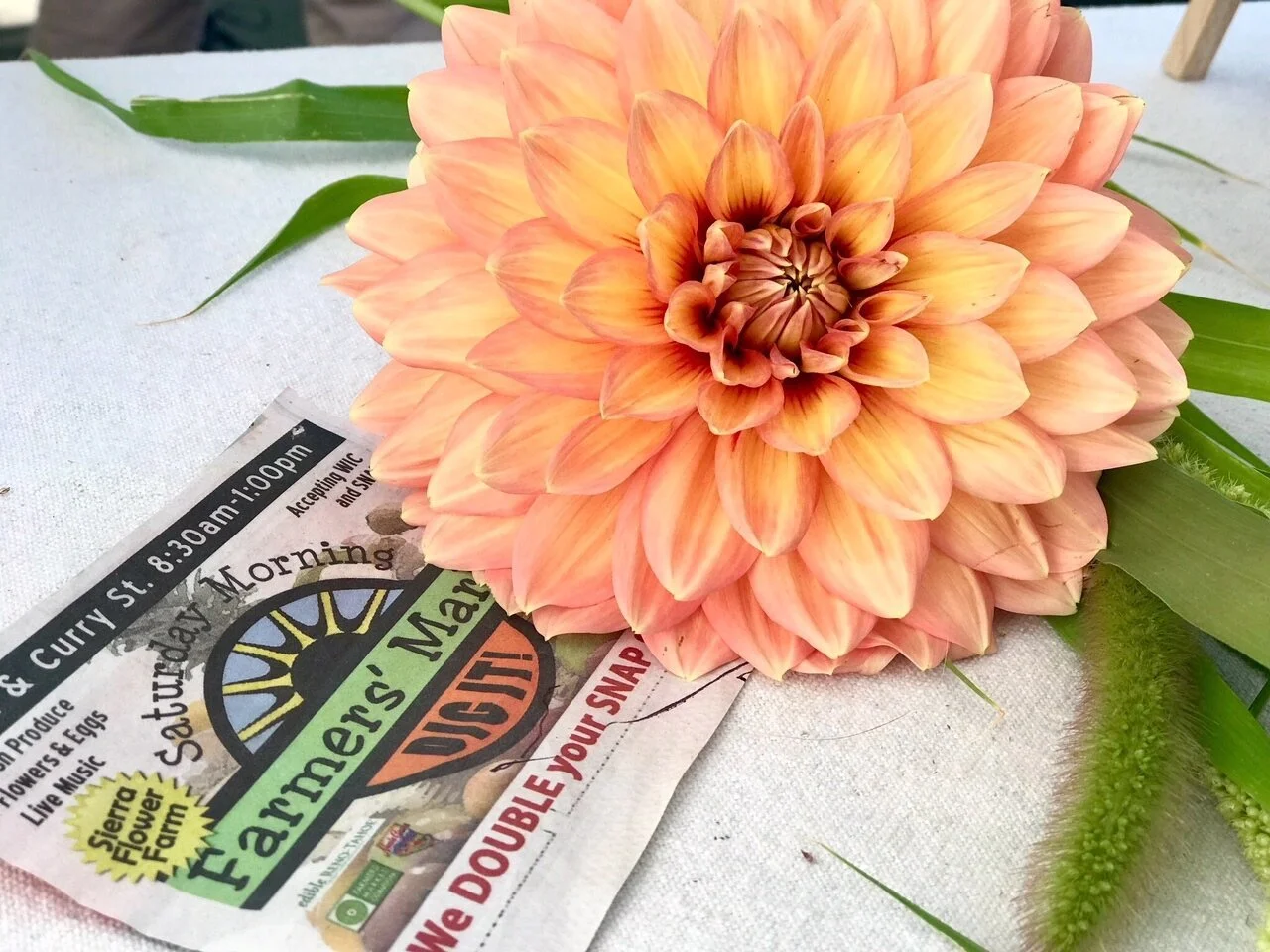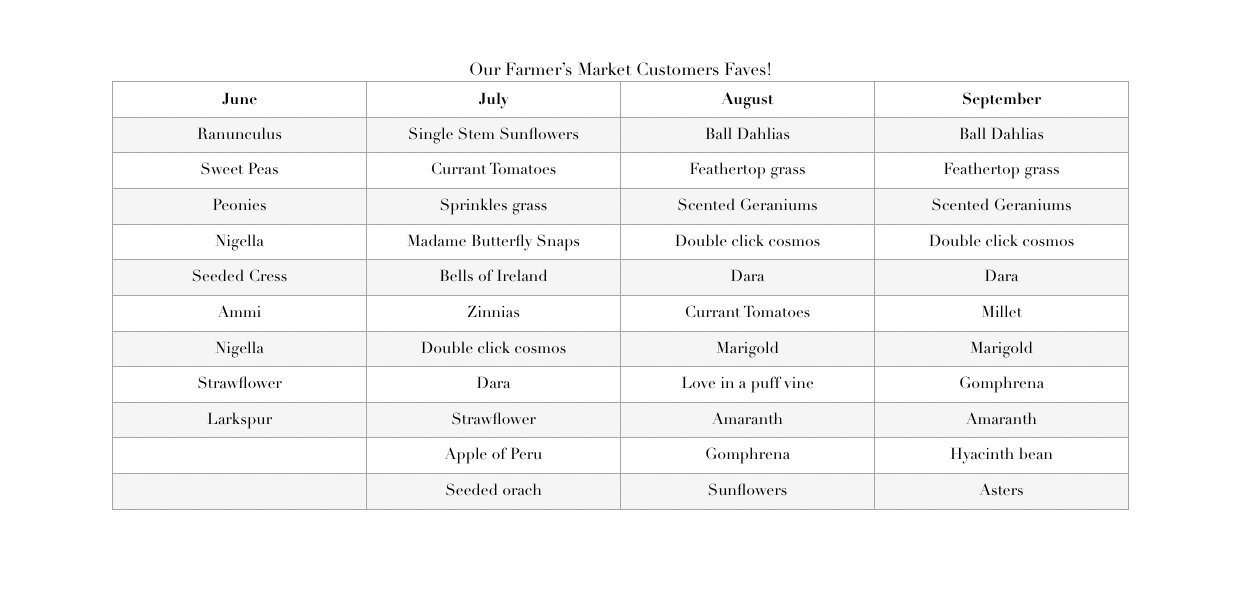Your Guide to Selling Flowers at Farmers Markets
When you’re deciding to turn flower farming from a hobby into a business, one of the first sales outlets to consider is the farmers’ market. For many, it’s a fantastic opportunity to learn, grow, and connect with your community. While it might not be the right fit for every flower farmer long-term, the value it offers—especially in your early years—can be significant.
Early mornings loading up for the farmers market—a little hustle, a lot of beauty!
Why Farmers Markets Matter
Farmers markets provide:
Exposure: They’re a great way to introduce your farm to the community and establish relationships with future customers.
Opportunities to Learn: Selling at a farmers market pushes you to sharpen your sales skills, refine your product offerings, and adapt quickly to customer feedback.
A Financial Starting Point: For many, the consistent weekly income provides a foundation to reinvest in their business as it grows. On the other hand, some flower farmers have found farmer’s markets to be incredibly lucrative, making them a key part of their business strategy.
Our Experience
We participated in a vibrant Saturday morning farmers market for three seasons. It was a lot of work—from early mornings and long drives to setting up and tearing down—but it came with memorable experiences and invaluable lessons. While it wasn’t our most profitable sales outlet over time, it played a crucial role in getting Sierra Flower Farm off the ground.
Here are the biggest takeaways from our farmers market journey:
Building Relationships
One of the most rewarding aspects of selling at farmer’s markets was connecting with customers. Many of our early market customers later became bouquet subscription members or custom order clients. Strong relationships build trust and brand loyalty—and it all starts with a welcoming smile and genuine conversation.
We were incredibly fortunate to have a market manager who not only helped us navigate the process of becoming vendors but also offered invaluable advice. She guided us in fine-tuning our bouquet quality, connecting with local media for added exposure, and even navigating the maze of permits and insurance. Her support was instrumental to our success. On top of that, she often brought homemade goodies to keep us fed during market days, a simple but thoughtful gesture that made the long days much easier and more enjoyable.
Exposure Pays Off
The farmers market was an essential stepping stone for our business. At the time, the cash flow was enough to keep us going, and it gave us the opportunity to build skills, confidence, and connections. The exposure we gained was priceless—customers recognized our brand, followed us on social media, and signed up for our email list. These early relationships created a foundation that allowed us to grow other parts of our business, significantly increasing its profitability over time. Without the farmers market, we wouldn’t have built the strong base that supports Sierra Flower Farm today.
Lessons Learned
Farmers markets can teach you how to handle competition, refine your products, and improve your efficiency. You’ll learn to:
Gauge how much product to bring.
Present your booth attractively.
Engage with customers in a meaningful way.
A thoughtful surprise from our market manager—she left this clipping at our booth to let us know we were featured in the local paper. Moments like these remind us how special our market community truly is!
What Products Should You Bring?
This is one of the most common questions! Here’s what worked best for us:
Core Products:
Large Bouquets ($19): A mix of seasonal flowers, wrapped beautifully.
Petite Bouquets ($8): Perfect for shorter stems and budget-friendly options.
Small Mason Jar Arrangements ($12): Great for gifting.
Signature Arrangements ($38): A premium option at a discounted price from our online offerings.
Novelty Offerings:
Adding something unique each week creates excitement and draws customers to your booth. For example:
Early in the season: Sweet peas or ranunculus bunches.
Summer: Sunflower bunches or gladiolus.
Late summer: Giant dinner plate dahlias sold by the stem. These were a hit despite their short vase life!
Value-Added Items:
In addition to fresh flowers, we found that offering value-added items like dried flower wreaths, pressed-flower cards, and even wooden bowls handcrafted by my husband, Graham, brought extra interest to our booth. These items not only helped fill empty-looking spaces as flowers sold out but also attracted a wider range of customers, including those who might not typically purchase fresh flowers.
Why include value-added items?
Engages a Broader Audience: While some customers are there for fresh bouquets, others are drawn to unique, giftable items like wreaths or decorative bowls.
Maximizes Sales Opportunities: Even if your flowers sell out quickly, having additional products keeps your booth active and profitable.
Creates Visual Appeal: These items enhance your booth\u2019s display, making it look abundant and inviting.
For us, Graham’s wooden bowls were particularly effective in engaging customers who might otherwise have passed by, such as men accompanying flower-buying partners. Conversations about the bowls often led to additional flower sales, and having a mix of items encouraged repeat visits to our booth.
Consider including items that complement your brand and farming style. For example:
Seasonal decorations (like pumpkins in fall or holiday ornaments).
Locally made or upcycled crafts.
Bundles of dried lavender or herbs.
Adding variety creates a more dynamic booth and gives customers reasons to stop, browse, and buy. Just be sure to clear your offerings with your market manager if they fall outside the category of fresh-cut flowers.
Bringing Extra Components:
Always have extra buckets of flowers on hand. They keep your booth looking full and allow you to create more bouquets or custom arrangements on the spot. Customers love watching you work, and it’s a great way to boost sales!
The building blocks of a market bouquet—every stem ready to shine! From dusty miller to ball dahlias, it’s all about creating something beautiful and fresh for our customers.
Choosing Varieties for the Market
Market bouquets are meant to be “kitchen table” florals—beautiful, long-lasting, and affordable. Selecting varieties with different vase lives and price points ensures that your bouquets provide value without compromising on quality.
Key considerations for market bouquets:
Mix common and unique flowers: While cosmos and zinnias are staples, pair them with less common varieties to stand out from vegetable vendors selling zinnias for $3 a bunch.
Balance cost and uniqueness: Save high-end varieties (like Cloni ranunculus) for event work, and focus on flowers with a strong impact but lower cost per stem for market bouquets.
Focus on vase life: Layer flowers with different vase lives, adding everlastings like strawflower and gomphrena or reliable foliage like dusty miller, scented geranium, or mint to extend the bouquet’s lifespan.
Pro Tip: Ball dahlias are a great choice for their excellent vase life. Customers appreciate flowers that continue to look fresh for days!
Ready to Learn More?
Explore tips on growing and designing the perfect components to take your bouquets to the next level. Click here to dive in!
Here are some tried and true varieties that our customers adore!
To Pre-Sleeve or Not to Pre-Sleeve Bouquets?
I’m firmly team not to pre-sleeve bouquets for market. Over time, we found that unsleeved bouquets sold better for several reasons:
Sleeves dipping in water can look messy.
Bouquets in sleeves appear smaller than they are.
Customers love choosing a bouquet that “speaks to them” and enjoy watching it wrapped just for them.
In a world where so much is pre-packaged, wrapping flowers on the spot adds a nostalgic, personalized touch. Here's how we kept the process efficient and charming:
Pre-cut kraft paper (18" for large bouquets, 12" for small), folded and stamped with our logo.
White tissue paper and twine for finishing touches.
Damp paper towels in compostable bags to keep stems hydrated.
A small dunking bucket for wrapping paper towels and keeping flowers fresh.
We always kept a few jars on hand for customers who needed them, even gifting them occasionally to secure a sale. Most customers returned jars later, creating another chance to connect and build loyalty.
Putting the finishing touches on our booth—bouquets, posies, and mason jar arrangements all ready to share a little bit of Nevada-grown beauty!
Booth Setup Tips
An inviting booth is key to catching customers’ attention and drawing them in. Thoughtful presentation and engaging interactions can turn passersby into loyal buyers. Here’s how to stand out:
Create a Welcoming Space
Use Layers and Risers: Adding height and dimension to your display makes it visually appealing and helps showcase your flowers. Use crates, baskets, or stands to create interest.
Keep Decor Neutral: Let your flowers be the star. We used canvas drop cloths, vintage milk crates, and galvanized buckets to keep the look simple yet timeless.
Clearly Display Prices: Use attractive signs or chalkboards to showcase your pricing and product options. This reduces hesitation and makes it easy for customers to shop without needing to ask.
Engage with Customers
Start with a Warm Greeting: A friendly smile and a “hello” go a long way in making customers feel welcome. If you're already helping someone, acknowledge new arrivals with a quick nod or greeting.
Chat While Wrapping: Small talk while wrapping bouquets keeps the interaction personal and helps customers feel valued. Share tidbits about the flowers they’re buying or tips for arranging them at home.
Tell Your Story: Customers love to hear about your farm, growing practices, and what inspires you. It creates a deeper connection and builds trust. If they seem especially interested, hand them a business card or invite them to visit your website or blog.
Offer a Special Touch
Wrapping bouquets on the spot with kraft paper, twine, and a damp paper towel not only ensures freshness but also adds a memorable, personal touch. Customers love seeing their bouquets lovingly prepared.
Pre-Prepare Materials: Cut and stamp kraft paper in advance, have twine ready to tie, and keep a bucket of water nearby for dampening paper towels. These little details save time and make the process smooth.
Highlight Your Branding: Ensure your logo or farm name is visible on wraps, signs, or tags. Customers walking around with your bouquets act as mobile advertisements for your business.
By creating a space that’s welcoming, well-organized, and uniquely “you,” your booth will naturally attract attention and encourage sales. A little extra thought goes a long way in creating a standout farmer’s’ market experience.
Want More Tips on Growing Your Flower Business?
Mastering your booth setup is just the beginning! For more insights on building your brand and reaching customers, start with Part One of our Marketing Basics blog series here. It’s full of practical tips to help your flower business thrive!
One of our first booth setups—layered with risers, bouquets, and charming details to create an inviting space for our customers!
Handling Competition
Competition is a natural part of any business, but it doesn’t have to be stressful or adversarial. The key is to focus on what you can control and use competition as an opportunity to grow. Here are some strategies to help you navigate it with confidence and build a strong presence at the market:
1. Provide Excellent Customer Service
Customers often remember how they were treated even more than the product they bought. Greet everyone with a smile, be approachable, and make them feel valued. Small touches like remembering repeat customers’ preferences or offering thoughtful advice about flower care can set you apart.
2. Offer a High-Quality, Well-Presented Product
Your booth and products are your best advertising. Take time to ensure your flowers are fresh, beautifully arranged, and attractively displayed. Eye-catching, well-wrapped bouquets or arrangements signal care and professionalism, making it easy for customers to choose you.
3. Build Community Over Competition
Instead of seeing other vendors as rivals, consider them part of your community. Get to know the other flower growers or market sellers. Share tips, trade products, or collaborate on ideas. For example, we’ve traded bouquets for massages or fresh produce from fellow vendors. These connections create goodwill and can even open doors to future opportunities.
4. Focus on Your Unique Value
Ask yourself: What makes your farm or product different? Is it your story, your growing practices, or the special flowers you offer? Highlighting your unique strengths helps you stand out without needing to compare yourself to others.
5. Learn from Your Competition
Rather than stressing about what others are doing, use it as an opportunity to observe and learn. Pay attention to what works well for them, and consider how you can adapt or improve your approach while staying true to your style and values.
6. Keep Improving Your Own Business
Your real competition is yourself. Focus on improving each week, whether it’s enhancing your displays, growing better flowers, or building stronger customer relationships. When you strive to outdo yourself, the rest falls into place.
By focusing on your strengths and fostering a sense of collaboration, competition becomes less of a hurdle and more of a motivator. The energy and camaraderie of a thriving farmers market can inspire everyone to do their best while building a supportive and welcoming environment for all.
A little flower farmer in the making—our daughter crafting her own bouquet at the market. These moments make market days even more special!
Doing Markets with Young Kids
If you’re a parent, bringing young kids to the farmers market can be both a challenge and a joy. For us, those early years at the market created wonderful family memories. From our kids “selling” bouquets to toddling around the booth, they grew up immersed in the hustle and bustle of market life.
Tips for managing kids at the market:
Bring special games, coloring books, or snacks that are only for market days to keep things exciting.
Foam pads for naps under the table or downloaded movies on tablets can be lifesavers for longer days.
Encourage kids to “help” in small ways—they’ll feel proud to be part of the business, and customers will love the family vibe.
These experiences not only made the market a family affair but also helped our children develop confidence and people skills that have stayed with them as they’ve grown.
A vibrant summer display—mason jar bouquets, sunflowers, and seasonal blooms all styled with vintage charm!
A Few Final Tips
Be Consistent: Regular attendance helps build trust and a loyal customer base.
Stay Hydrated and Energized: Long market days require stamina—don’t forget water and snacks!
Track Your Sales: Take notes on what sold well, market conditions, and customer feedback. Patterns will emerge that can guide your future decisions.
Have Fun: Farmers markets are full of energy, community, and opportunities. Enjoy the experience—it’s a unique way to share your flowers with the world.
Farmers markets might not be for every flower farmer, but they can be a fantastic way to grow your business, gain exposure, and hone your skills. Whether you participate for a season or make it a cornerstone of your sales strategy, there’s plenty of value to be found.
Happy flower farming!
We are looking forward to sharing more blooms with you soon.
Jessica & Graham













